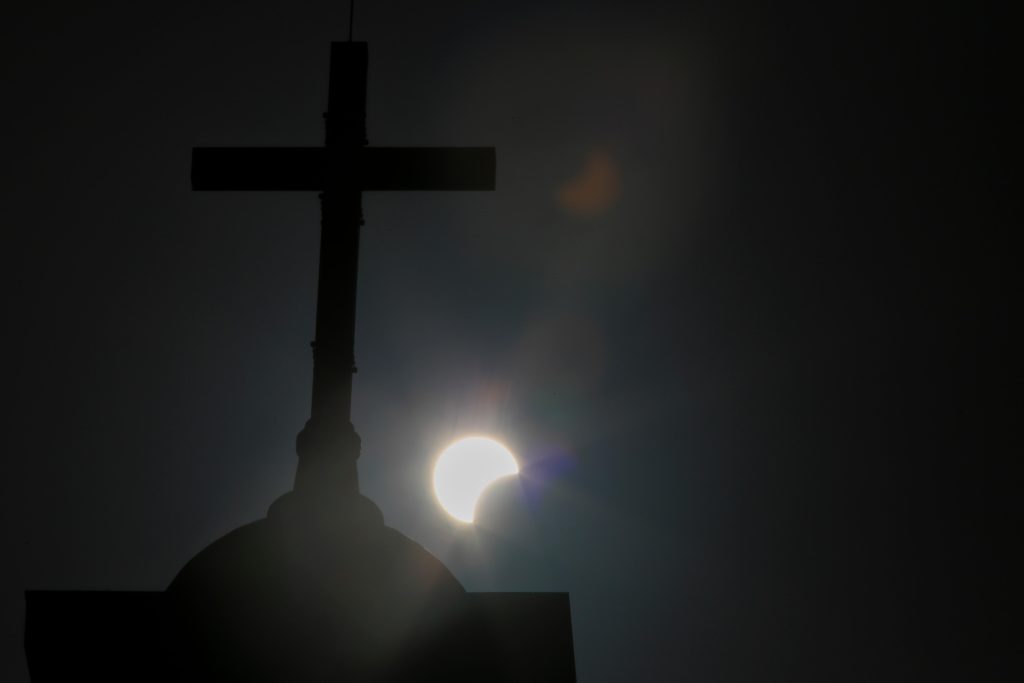Throughout history, solar eclipses have deeply affected followers of different religions around the world. They were seen as messages from God or spiritual forces, stirring up feelings ranging from fear to amazement.
Before the total solar eclipse that will travel a long path over North America on Monday, let's explore how some of the world’s major religions have reacted to such eclipses over the centuries and in modern times.
Buddism
In the Tibetan Buddhist belief, it is thought that the impact of positive and negative actions is amplified during major astronomical events like a solar eclipse.
According to the late Lama Zopa Rinpoche of the Foundation for the Preservation of the Mahayana Tradition, both lunar and solar eclipses are favorable days for spiritual practice. He has mentioned that the positive karmic results of good intentions and actions generated on lunar eclipses is multiplied by 700,000 and on solar eclipses by 100 million. Some of the recommended spiritual activities on these days include reciting mantras and sutras.
Christianity
Some Christians believe that an eclipse indicates the arrival of the “end times” before Christ’s return to Earth as prophesied at various points in the Bible. One such reference is in the second chapter of Acts: “The sun will be turned to darkness and the moon to blood before the coming of the great and glorious day of the Lord.”
There has also been a persistent belief among some Christians that an eclipse took place during the crucifixion because three of the Bible’s four Gospels mention a three-hour period of darkness as Jesus died.
“It was now about noon, and darkness came over the whole land until three in the afternoon, for the sun stopped shining,” says Luke 23:44.
It’s been noted that a three-hour period of darkness doesn’t suggest a solar eclipse, which produces only a few minutes of darkness.
But a recent commentary on ChurchLeaders.com — a website supported by numerous prominent evangelical pastors — said the darkness described in the three Gospels “represents a profound spiritual transition.”
Hinduism
The origin of eclipses in Hinduism is detailed in ancient legends called puranas. In one legend, the devas and asuras, who represented good and evil respectively, churned the ocean to obtain the nectar of eternal life. As one of the asuras, Svarbhanu, disguised as a deva to receive the nectar, the Sun god (Surya) and Moon god (Chandra) alerted Mohini, an incarnation of Lord Vishnu, who then used a discus to behead Svarbhanu.
But because the asura had already consumed a portion of the nectar, his immortal but separated head and body lived on under the names Rahu and Ketu. Legend has it that Rahu occasionally swallows the sun and the moon because of the gods’ part in his suffering, causing solar and lunar eclipses.
Hindus generally consider a solar or lunar eclipse as a negative sign.
Islam
In Islam, a solar eclipse is a time to turn to God and pray. The eclipse prayer is based on narrations of sayings and actions of Prophet Muhammad.
Kaiser Aslam, who is a Muslim chaplain at the Center for Islamic Life at Rutgers University, said one story mentioned the prophet as saying: “The sun and the moon are two signs among the signs of Allah and they do not eclipse because of the death of someone. … Whenever you see these eclipses pray and invoke (Allah).”
The account was that “after the death of the Prophet Muhammad’s son, Ibrahim, his companions tried to comfort him by saying that the sun eclipsed due to the greatness of the loss,” Aslam said. “The Prophet corrected them by reminding them that the sun and moon are signs of God and to not add any superstitions as to why an eclipse happens.”
On April 8, Aslam will lead the “kusuf” prayer on campus. Normally, there’s a short speech after the prayer to explain the teachings behind it and dispel any superstitions around it, he added.
“It is a lovely and meaningful prayer that emphasizes our connection with God’s creation, making sure to give our devotion to God, instead of incidental occurrences in God’s creation,” Aslam said.
Judaism
The Talmud — the collection of writings compiled more than 1,500 years ago that constitute Jewish religious law — offers specific blessings for many natural phenomena, but not for eclipses. Instead, it portrays an eclipse as “an ill omen for the world.”
Writing in early March for the Orthodox Jewish education organization Aish, Rabbi Mordechai Becher noted that Judaism has longstanding connections with astronomy. He said there are three craters on the moon named after medieval rabbis with expertise in astronomy.
As for eclipses, Becher — an instructor at Yeshiva University — suggested they were made possible by God for a profound reason.
“He created a system that would remind us regularly that our choices can create darkness, even at times when there should be light,” he wrote. “Our free will choices can create a barrier between us and the Divine light, but can also allow Divine light to be seen here.”









